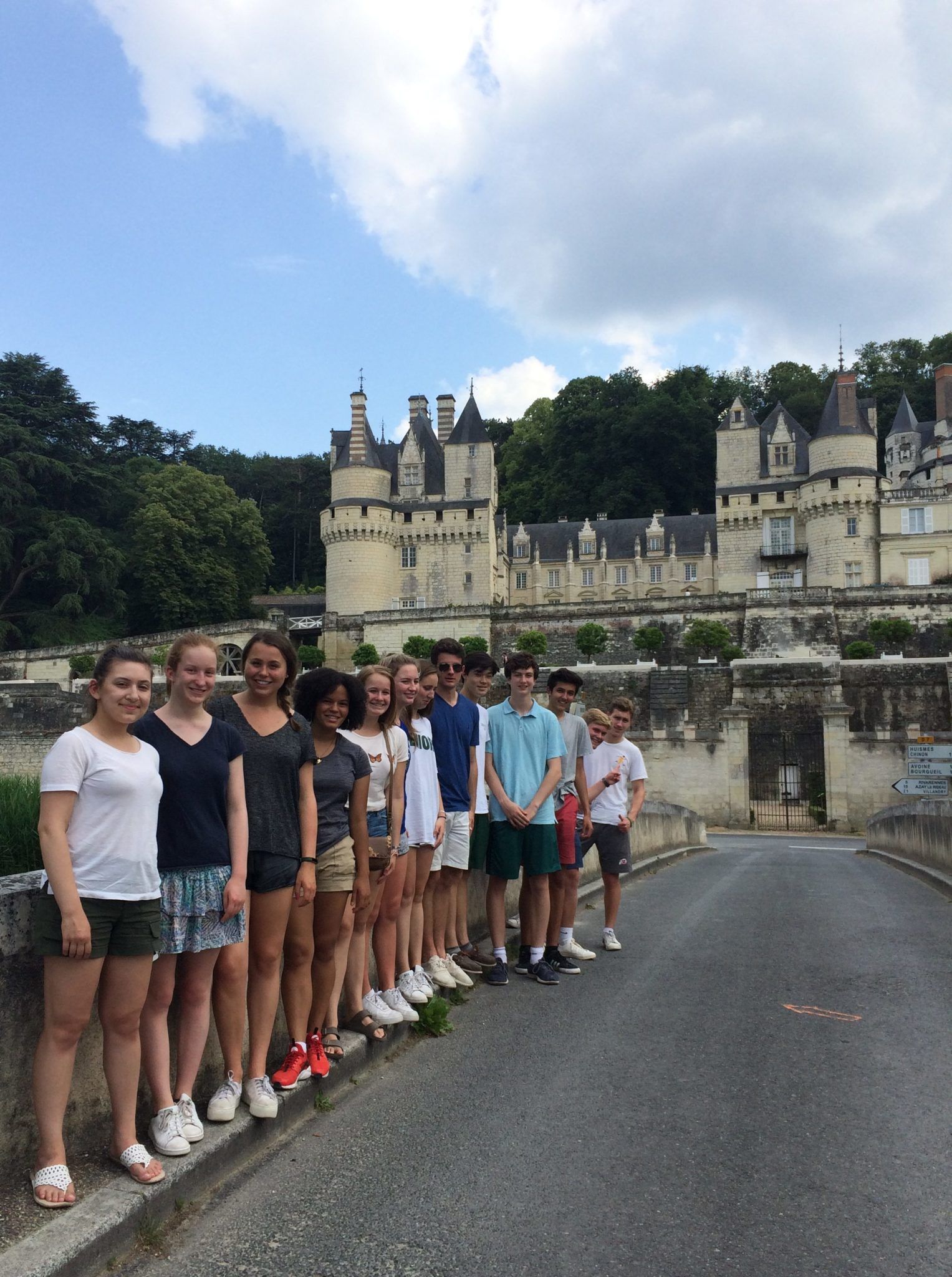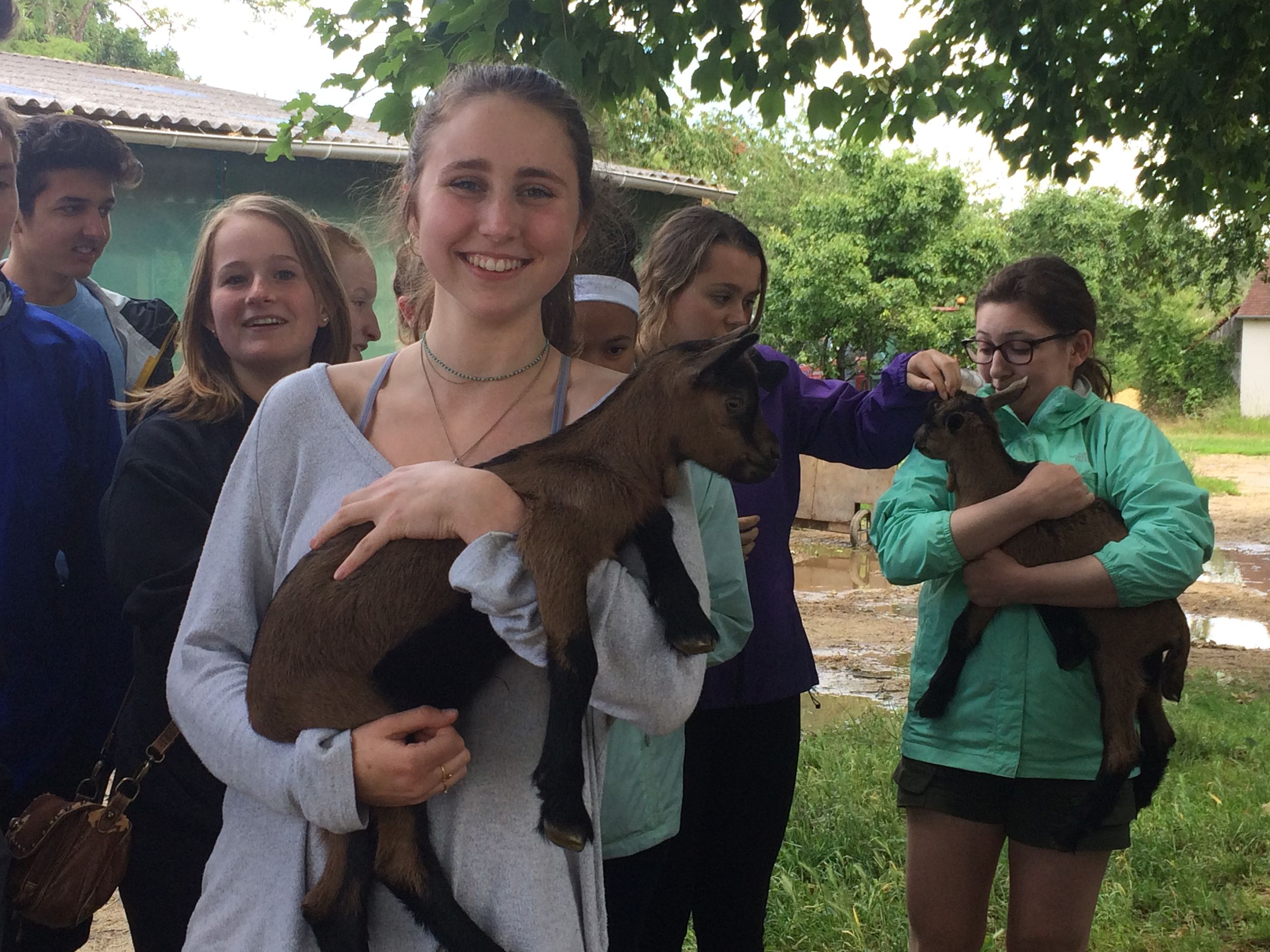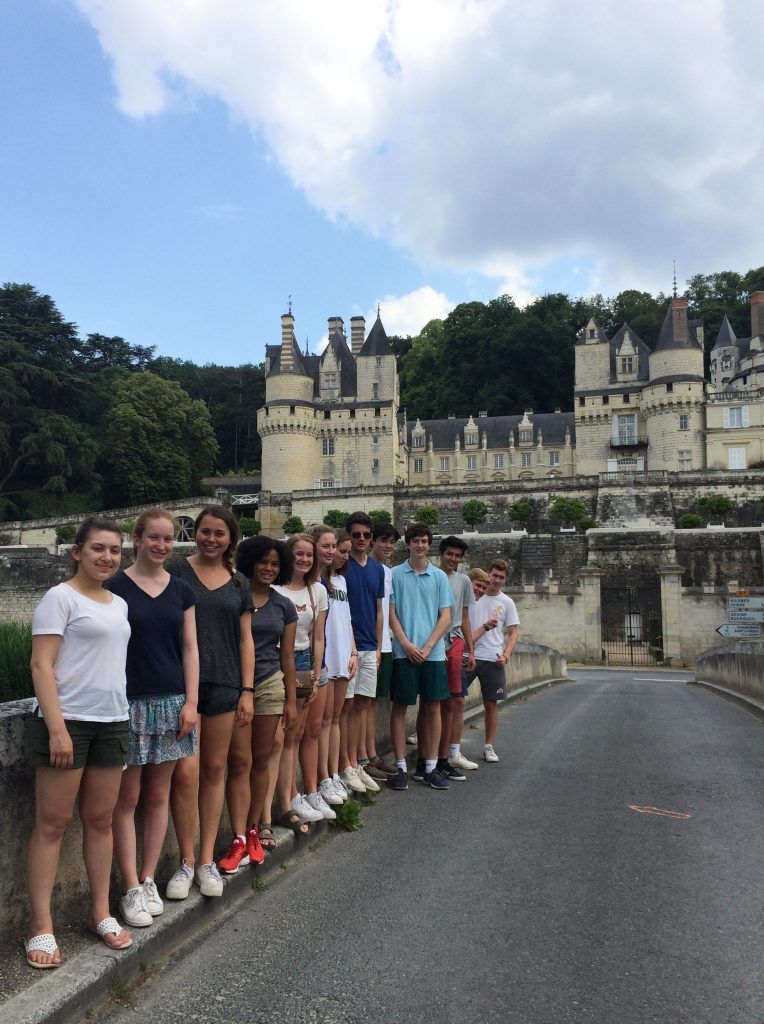As the France trip comes to a close, students reflect on their experiences visiting Paris, Normandy, and living in Tours with a host family, they compare the differences and similarities between Deerfield and Tours, and share what they have learned during their time in France.
Crawford Rice ’21:
As our one month in France comes to an end, I’d like to take some time to reflect on my experiences thus far. To begin with our daily life, the pace and style of Tours has drawn many similarities to that of Deerfield. Our class day is shorter, yet certainly more focused and concise. In the classroom, it has been enjoyable to learn in a more relaxed atmosphere, focusing primarily on our oral and grammatical skills through various games and exercises. The afternoon excursions are a good change of pace, as we visited several ancient chateaux and museums.
Perhaps the most significant change in my daily life has been our freedom to explore Tours after our visits and during lunch. I’ve greatly enjoyed my time exploring the town, and learning more about French culture. Before my arrival at Tours, our group was fortunate enough to spend several days in Normandy and Paris, and visiting the Louvre was a fantastic experience. Although the Mona Lisa was a little disappointing, it was amazing to view with my own eyes many pieces of art I had read about in textbooks. I also found it interesting to explore the city in smaller groups, visiting the Champs-Elysees and other historic landmarks to get the most out of my time there. In Tours, I was amazed by the intricacy and complicated architectural designs of several chateaus, yet the Chateau Chenonceau proved to be my favorite. Located entirely atop a small river, a grand, gravel pathway slowly revealed the overwhelming castle. A helpful audio tour made it simple to imagine what the bustling life of those 1100’s royals may have been like.
Like any month-long trip, there were some low moments. At times, the scorching hot weather made visiting ancient sites feel difficult and repetitive, but I’m very aware that as I age, I will come to appreciate and admire these experiences. As a result of the freedom I was awarded during my time in Tours, I’ve felt more confident in my ability to remain independent during the day. I am sure that my French speaking skills have undoubtedly improved. The nervousness and uncertainty of asking for directions and ordering food has increased my confidence in my own ability.
Lastly, I was fortunate enough to have a supportive home stay family willing to help me learn. There were, of course, awkward silences at the dinner table, and many times when I found myself repeatedly asking ‘pardon’ to my home stay family after not comprehending their question. Stella, my family’s cat, was not exactly fond of me, and has trapped me inside my room for up to an hour at times. I do believe she is starting to like me now, however. I enjoyed playing basketball and Nintendo tennis with Elliot, my ten year-old brother, and board games like Monopoly and Clue with the entire family after dinner. Each of them played an amazing role in making me feel welcome in their home, and I could not thank them enough for that effort. In the car ride home from the train station, my home stay mother told me they would exclusively speak French to me, and my family has held their promise thus far. In summary, my journey around France has had many ups and downs, yet my experience will be a part of my memory for a long time. I am glad that I was willing to apply for the trip, and look forward to continuing learning the language next year.
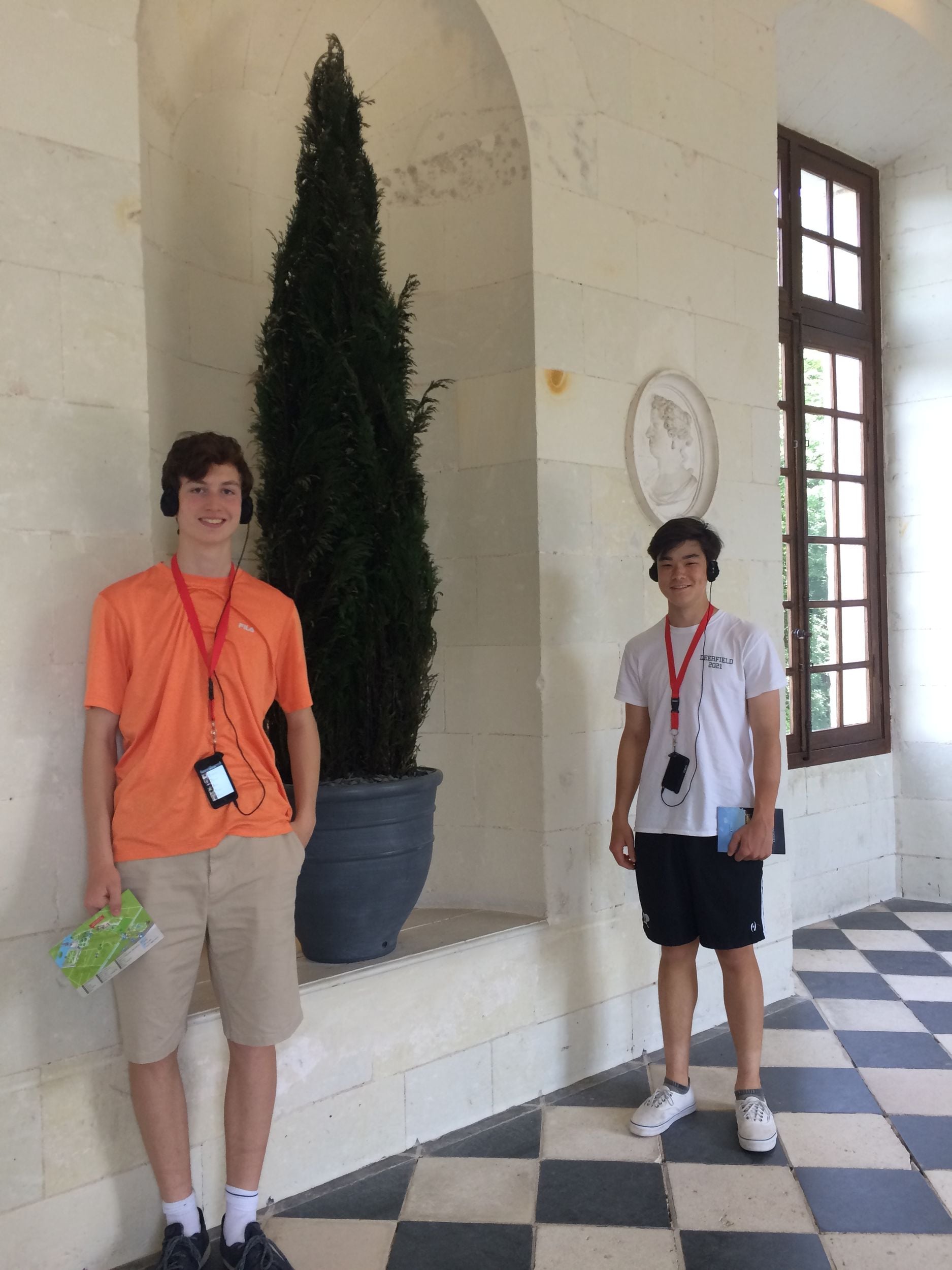
Helen Lipsky ’20:
Over the past four weeks, I’ve been able to observe and participate in the French culture, allowing me to gain perspective on a lifestyle a bit different than mine back at home and Deerfield.
In general, the most prominent, observable difference between daily life in France and daily life in the United States, more specifically Deerfield, is the pace at which each day moves. The French have a tendency, and most often a gift, to take a slower approach to the day. They culture values and appreciate time with people, friends, and family. You can see this aspect of the culture just through the length of the meals, which tend to be on the longer side with many courses and ample time to socialize. In the United States, and especially at Deerfield, the daily life is structured on a more work-oriented routine, and social interaction is welcomed somewhere in between. Consequently, daily life at Deerfield, and just in general, feels more rushed.
Adjusting to this new lifestyle allowed me to strengthen my abilities to adapt to discomfort. Being in a foreign country for the first time definitely left me with many moments of uncertainty: not knowing how to read that sign on the street, not knowing how to ask for the salt and pepper at a restaurant, not knowing what was considered polite or impolite by the general public. Exposing myself to this constant, omnipresent apprehension gave me an opportunity to strengthen the “muscle” that dictates how easy it will be for someone to learn to see the good in something that might initially make them feel uncomfortable. But, I wasn’t always able to act with this newfound strength. There were times when I was with my home stay family that I found it easier to mind to myself, and I was on the quieter side during almost all of our family meals. This wasn’t because my family failed to make me feel welcome. On the contrary, my host family did their absolute best to perpetuate an environment where I wouldn’t feel judged and where I’d feel comfortable to practice my French. But, during the meals, if I didn’t have a perfect French sentence or question prepared in my head, I would be extremely hesitant to speak. The moment for me to slip my grammatically-incorrect comment into the conversation would pass and for the remainder of the meal, I would just try my best to understand the conversation my family was having on their own. This fear of what other people thought, present not only at my host family’s dinner table, limited my potential improvement over the elapsed four weeks. Nonetheless, this trip was the first time in my life I was really able to strengthen my ability to manage and accept discomfort in an environment that I had truly never experienced when I got off the plane on June 1st.
Julia Ferrante ’20:
Over the past month, I’ve really enjoyed comparing life in France to my daily life at DA. First off, I was shocked to find that dinner is served around 9-9:30 pm in France. I have grown to like this adjustment because I am not hungry for a second meal around 9 or 10 pm. At Deerfield we eat about 4 hours earlier. Additionally, in France, they have a separate course just for cheese! I came to France not liking cheese, but am happy to say that my family introduced me to Camembert, which I now love! I was lucky to have a great host family that made special French dishes for me. I will definitely miss my host family’s cooking!
For me, the best moments have been spending time with my family, just listening and participating in the French culture. It’s been rewarding to learn that my French skills improved just by spending 3 weeks with a French family. I have also really enjoyed the French public transportation system. I feel it is very organized and an opportunity for independence. Lastly, I have enjoyed teaching my family English. For example, we played Scrabble. This was an amazing opportunity to share French and English vocabulary. It is rewarding to feel that we have culture and langue to give to our families as well. I am sad the trip is coming to an end, but look forward to continuing learning French language and culture at Deerfield.
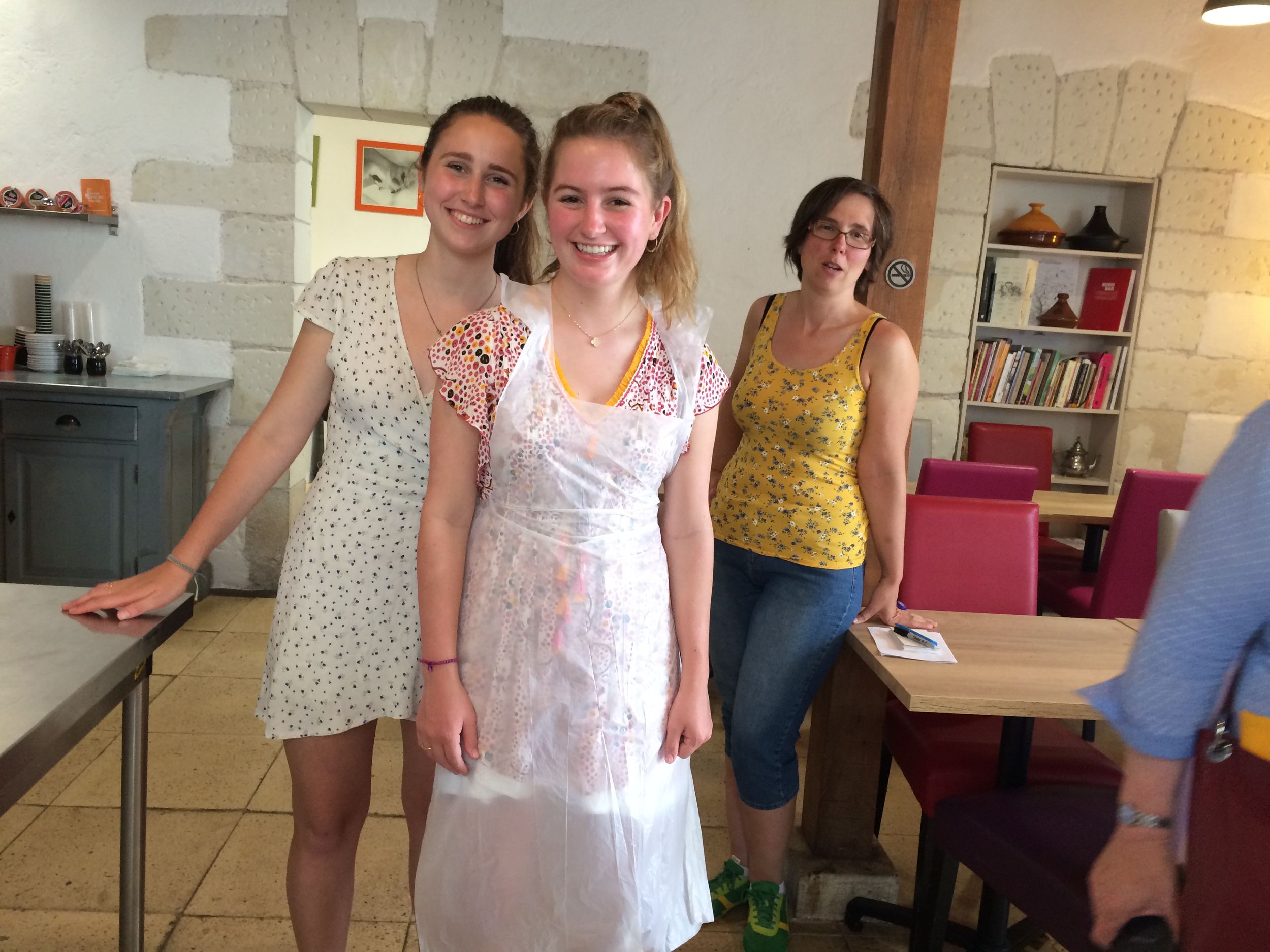
Lukas Trelease ’20:
For a long time the idea of traveling to another country and living with another family was one of the more frightening things I could think about. In 2015, however, I went to France with my school (at that time Bement) and did a home stay for two weeks outside of Paris. It was an unfortunate experience in which my host brother played video games and the mom preferred to practice her English on me rather than tell me what a coffee machine was in French. I was, in a way, scarred; I didn’t want to do a home stay again. But as time went on, and I heard about the great experiences friends and other students were having through Deerfield programs or SYA, I felt my interest peak once more. I decided to apply for the French trip and hoped that I would a) get in and b) be given a good family, a family that was nice and talked and was interested in the same things I was. And I got what I wanted. My family, a mother and her two daughters, were people who loved movies, books, and theater. So we were similar. But I decided, as I unpacked my things in their house after just coming back from the train station, alone in an unfamiliar room, that I would try, that I would talk.
Talking, in unfamiliar settings with people I don’t know, is difficult for me. If anyone has ever been in a class with me they’d tell you that, in the beginning, I am not the most participatory student they’ve ever met. I guess I don’t want to mess up, say something incoherent or wrong, fail, embarrass myself, etc. But as I brought down my typical Deerfield exchange student gift, maple syrup, I decided to give it a go. If I messed up now I had to live with these people who’d think I was weird for only three weeks (sarcasm)! And, I discovered much more than what their dossiers had said. My family appreciated talking and wanted to talk about politics and global warming and feminism and les gilets jaunes. They liked history and philosophy and music and “A Star is Born”. They could understand why I didn’t like “Bohemian Rhapsody” (the movie) and I could understand why they did (sort of). They loved the Oscars and Saoirse Ronan and Van Gogh and Klimt. All in all we were very similar. We appreciated the same things. And although there was a language barrier and a culture barrier I was able to break the ice faster than I’d ever been able to before.
Communication is pretty magical and it comes in all different forms: spoken language, written language, Morse code, Braille, eye contact, body language, etc. It’s even in the name of the CSGC. This trip was designed around improving our communication both through the French language and to people we’d never met before. On both counts I feel I’ve succeeded. I guess this is cliché and this whole blog may come off as bragging, but the lesson I learned about communication is that it doesn’t take much. Just put yourself out there. Open the door. Fly in the face of discomfort and make it laugh. Talk, not about the weather, but about the world, the real things, etc., etc. For me that worked. Who knows if it will hold for the next time. Because after this experience I definitely want to do this again.
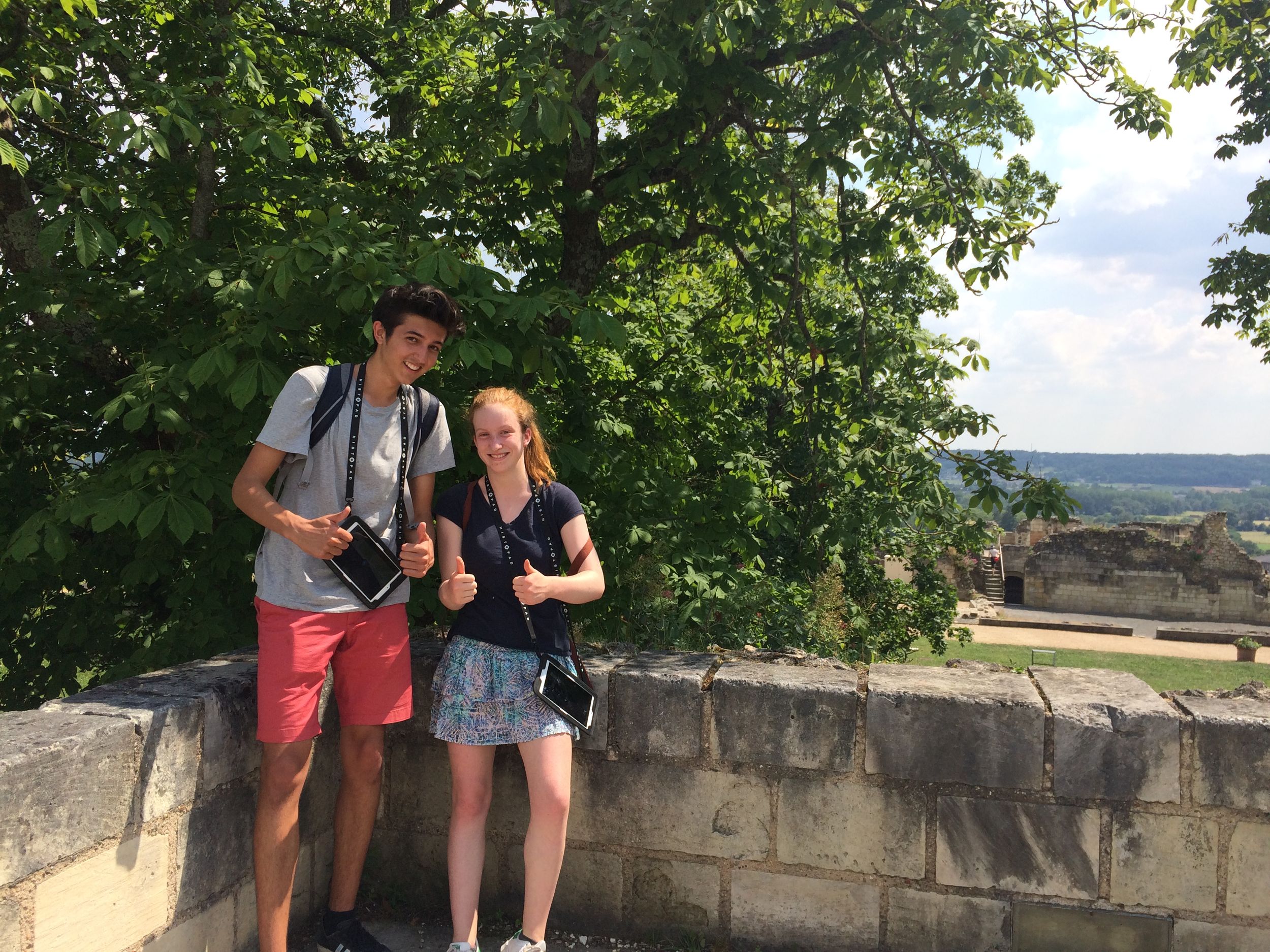
Maddie Poole ’21:
Before coming on this trip I had no idea what to expect, which I guess is a good thing because it meant I took everything as it came and with an open mind. Being in France of course has its differences, it’s a different country with a different culture, and a whole different language. However, because I have visited France quite frequently with my parents and brother to visit our family that lives here, I wanted this trip to be different. I wanted this trip to immerse me in French culture in a way I’d never experienced.
Compared to life at Deerfield and life at home there are the simple differences, like the fact that it’s quite rare that the French won’t eat cheese after lunch and dinner. Or that you will never see French girls and women wearing leggings outside the house unless they’ve just come from exercising. Not to mention that the French can somehow wear jeans in 90 degree weather. By being a part of a French family I was able to understand and get a glimpse of what it’s like to grow up in France. Ten year old me who would read books and wonder what it was like to live a different life than the one I had would be geeking out. To put it shortly, living in France on my own for three weeks was a little bit surreal. I got to experience the crisp wind in my hair as my host sister and I rode our bikes back at 11 pm from hanging out with some of her friends. With street lamps lighting our way we zipped past dark store fronts and quiet houses. I couldn’t help but think how this is something I would never experience at home.
First of all I live in the middle of the forest, so the scenery would look quite different, and it would also probably take about an hour to bike to my house from a friends instead of twenty minutes. Experiencing sleeping in Saint-Avertin was calming; however, this calm was occasionally interrupted by other teenagers returning home on bike as well, or someone walking their dog. When this would happen all I could think about was how there could possibly be so many other people returning home by bike at 11:20 pm. My host sister and I returned home with everyone asleep, the parents simply trusting that she would make sure we got home by the time they had agreed.
By living in Tours I was introduced to another mode of independence, also known as the public bus system, something I don’t use very often by living in rural Massachusetts, where really the only mode of transportation is by car. My tendency to lie in bed for an extra ten minutes after my alarm would go off had to be broken after I missed my bus one morning when it happened to arrive three minutes earlier than usual. After a devastating, “Noooooooo” as I witnessed from across the street, not standing at the bus stop, the bus go zooming pass, instead I had to figure out my way to school. Taking a deep breath I thought through the bus routes I had become familiar with after two weeks, called Madame to see if she could let my Professor know I’d be a little late, and made my way to school. Being on this trip has helped to solidify the independence I already had, and my ability to navigate through less than ideal situations, not to mention navigate them while speaking French.
There have been many great moments on this trip. There have been moments of bonding with the group, moments of learning, and moments where I’ve been pushed out of my comfort zone. But with my host family what’s been the most memorable is when both cultures have collided and combined. My host mom goes swimming twice a week, and since I do two seasons of swimming-involved sports I was excited to join her one Thursday. What I was expecting was a semi relaxed swim workout that I’d easily be able to understand in French, hopefully aided by demonstrations. What I participated in, however, was a full on swim workout similar to the workouts I have at Deerfield, along with trying to understand the swimming vocabulary that had not been taught to me in my French class. As the practice went on, I became more familiar with the group of people in my lane, and understanding what it was the coach wanted us to do. By the end I was smiling at my host mom, feeling good after a workout since I hadn’t participated in sports for around a month, and feeling closer to her as well. I was able to share passions of mine with them and experience them from the perspective of the French. Whether it was cheering altogether while watching the U.S women’s soccer team win their game against Sweden, or zip-lining and navigating ropes courses at a nearby place in Tours, these moments helped me to increasingly grow closer with my host family and expand my knowledge of the French language.
As this trip comes to a close it’s kind of hard to believe I will no longer be speaking French almost 24/7. I’ve gotten used to eating dinner with my whole host family, and spending time with and chatting each evening with my younger host sisters energetic self. There has started to be a familiarity with my routine here, and the day-to-day activities. But what I’m most grateful for, is how my ability to speak the language more fluidly, comprehend conversations, and formulate my thoughts quicker has constantly been pushed and been improving while being here. This trip is something I will forever remember and be grateful for, and will carry with me as I continue my journey with the French language, and my growth as a human.
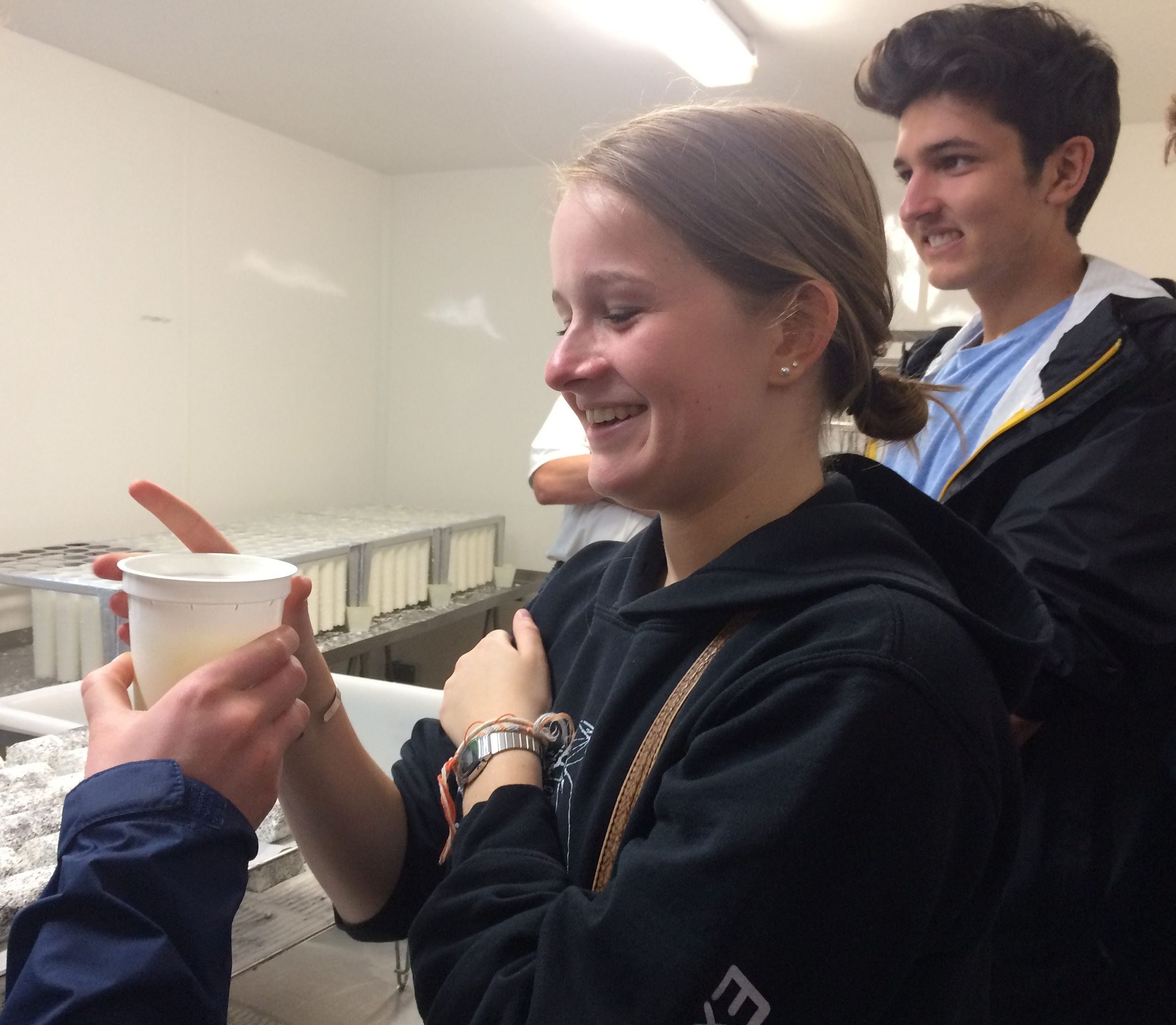
Nick Fluty ’20:
1. When I wake up every morning at DA, I practically jump out of bed with excitement because I know that in about 40 minutes , I’m going to be chowing down on some eggs. In France, this is not the case. Aside from omelettes at lunchtime (???), French people don’t really eat eggs, or even breakfast for that matter.
2. The greatest moment of the France trip, and probably my life, was seeing the Eiffel Tower in person. I am a huge Eiffel Tower fan, and I was jumping with excitement when I saw the massive wrought iron structure with my own eyes. It was amazing.
3. A moment of personal growth during this trip was being able to actually hold a thoughtful conversation with someone in French. I was a little nervous about staying with a family and only speaking French, but I felt a sense of accomplishment after realizing I can communicate with them.
4. The biggest surprise was the non-existent breakfast waiting for me on the table every morning. I love France, but the fact that a piece of bread qualifies as the most important meal of the day here is beyond me. Another surprise for me was how much fun I’ve had on this trip. I’ve seen and done things that have been so awesome and memorable, and for that, I am eternally grateful.
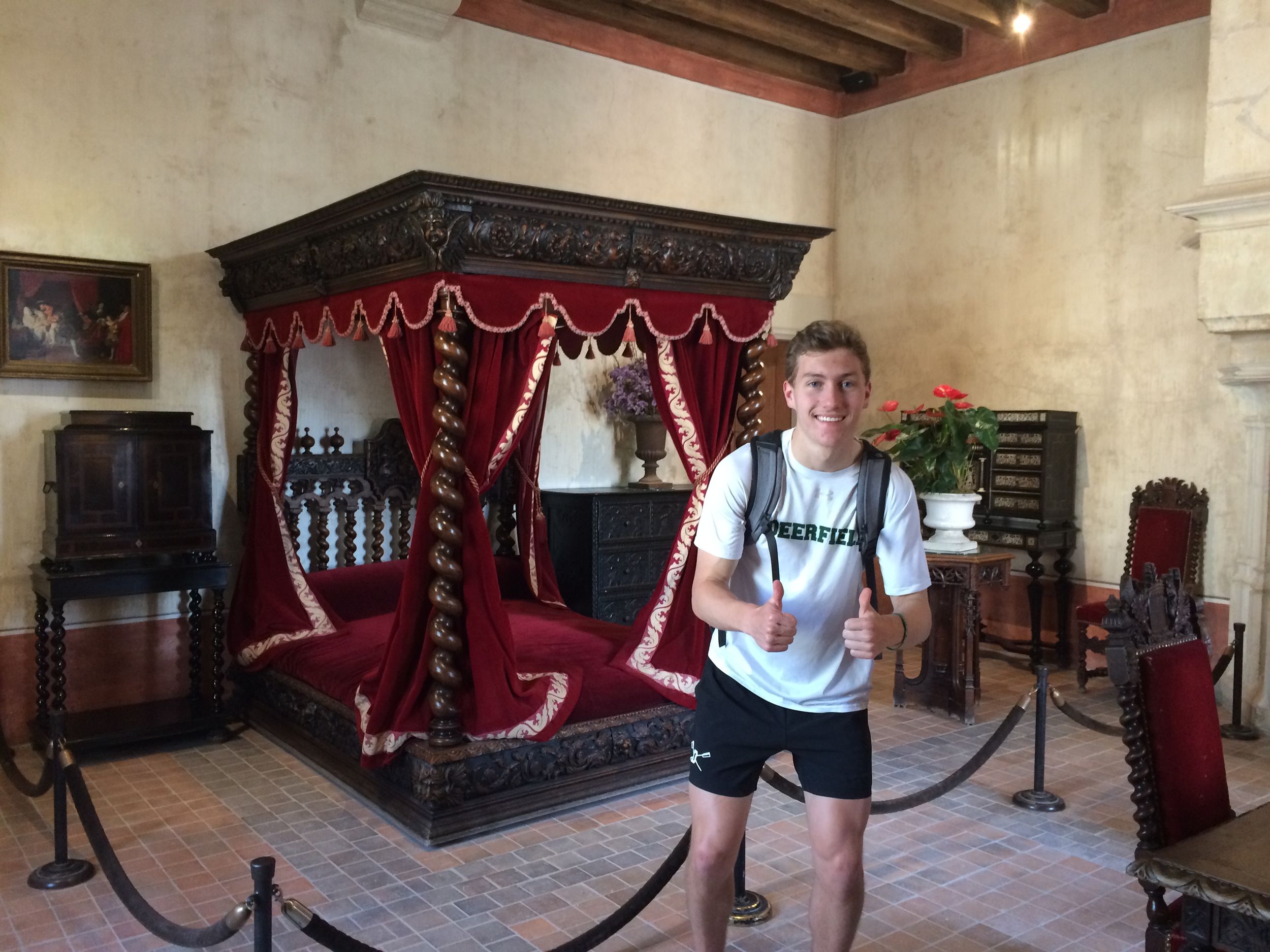
Robert Sawyers ’21:
From my experience here in France, daily life in Tours has some similarities but also some differences when compared to life at Deerfield. For similarities, the one major similarity between life in Tours and life at Deerfield is the daily schedule. For our schedule in Tours, we always have class from nine am to twelve pm, after class we have a set amount of time to eat lunch, and following lunch we have a special journey visiting a castle, garden, museum… the list goes on and on. Over the course of three weeks, this schedule became fairly perfunctory to me as there was almost no variation to the day except for the special journeys following lunch. This is the same for Deerfield. Deerfield’s schedule lacks variety and excitement and is more of a routine continuing throughout the entire school year. We wake up early to eat breakfast, go to our classes, and finish our day with co-curriculars. However, the main difference between life in Tours and life at Deerfield is the freedom we were given to roam and explore the city of Tours. As I said before, we were given a set amount of time for lunch, and within that time period, we were able to choose any restaurant in Tours to eat lunch.
In addition, after our group excursions to famous sites in Tours, we were given the rest of the day to do whatever pleased us, whether it be shopping, going for a walk in Tours, or buying pastries as a small snack. Another difference is the group excursions in place of co-curriculars. At Deerfield, a main part of a student’s day is their co-curricular after class. Here, we have group excursions after class to sites in Tours. These excursions have included castles, museums, gardens, “fromageries”, a cooking class, cemeteries, and more.
One of the best moments on this trip was visiting Omaha Beach and the American and German cemeteries for World War II. Visiting Omaha Beach was a fantastic experience. Being able to walk in the bunkers and on the beach itself helped me envision the chaotic battle which occurred on June 6, 1944. Following with visiting the cemeteries really brought the entire experience together. The magnitude of the cemeteries honored the soldiers well, and the time we were given to reflect at the cemeteries allowed us to pay our respects to the soldiers who sacrificed their lives on D-Day. One of the less pleasing moments on the trip was visiting the Musée des Beaux-Arts. This was the final art museum which we visited, but with the combination of heat and fatigue from the previous three weeks, it was not one of the most fulfilling experiences.
A moment of personal growth on the trip was my first time riding the bus home from school. Not knowing the correct route back to my house, I had to figure out which bus to take and when to transfer to another bus. Being in France, the challenge of returning home was escalated by having to understand my instructions of returning home in my second language. Reading the bus map, I figured out how to return home safely, and now I am able to navigate my way through the city almost perfectly.
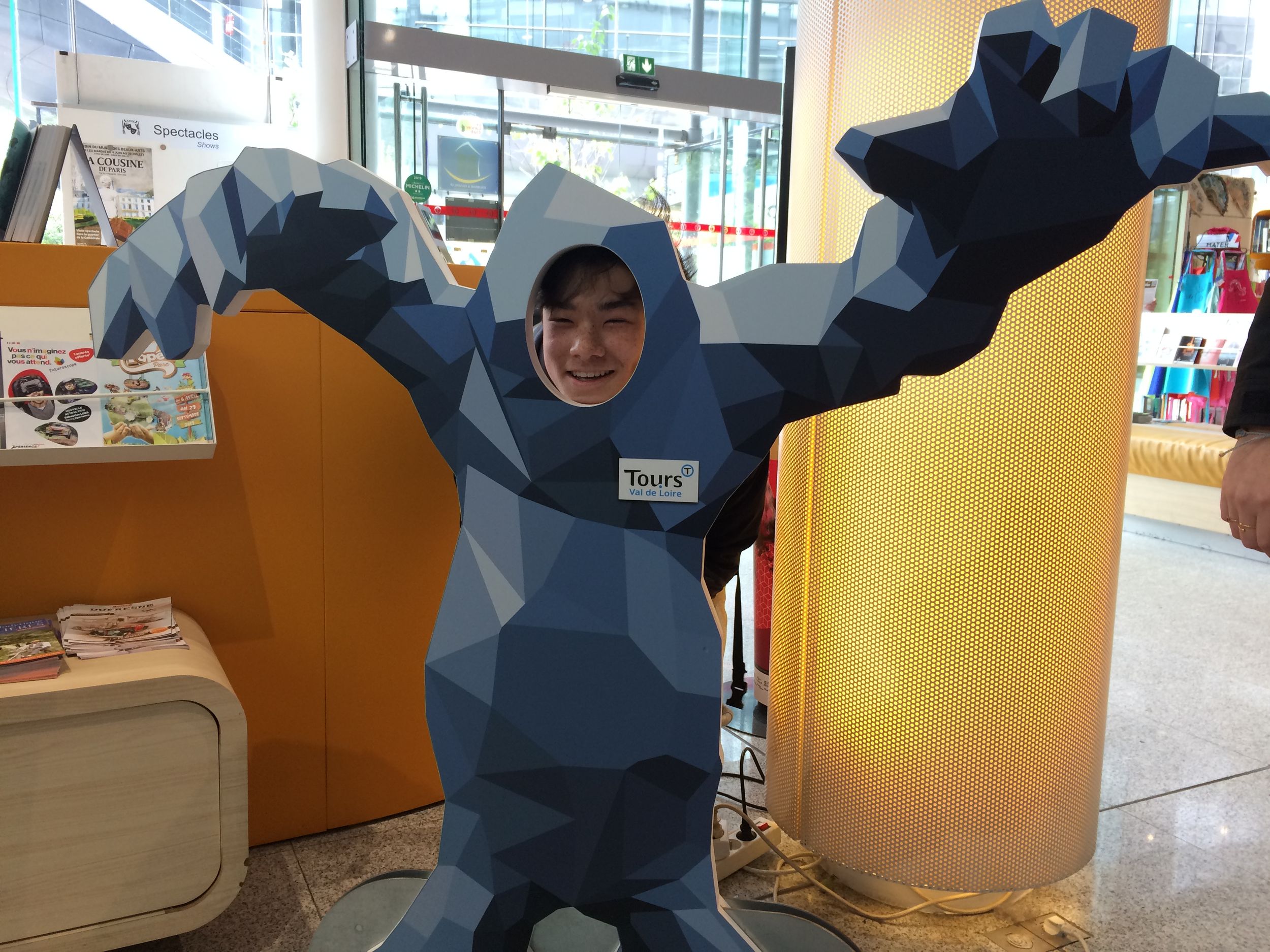
Sydney Gregg ’20:
This past month in France, I acquired more than just better language skills. I learned how to deal with discomfort and how to adapt quickly to new surroundings. Sure, as a DA student, I’m used to being away from home and living with other people. However, this trip I had to learn how to fit in to the daily life of a family, instead of being able to do my own thing in my single dorm room, like at school. Nevertheless, I found the experience rewarding. It’s one thing to visit a country, but being completely immersed in the every-day life of a French family has been something unlike anything I’ve ever experienced.
Throughout my time as a French student, I’ve struggled with talking in class out of fear of imperfection. However, this trip I was finally able to let go of the stress of feeling my French constantly had to be flawless and just work on getting my ideas across, even if it took several explanations and grand hand gestures. I realized pretty early on that my host family would rather I speak broken French than say nothing at all, and I grew to view making mistakes as humorous and inconsequential, rather than deeply embarrassing. This breakthrough is the biggest reason I saw major changes in my speaking over our month in France.
Of course, there were times this past month when living with a host family was difficult. There were several situations where I felt I couldn’t effectively communicate my thoughts and felt compelled to retreat into iPhone to cope with the awkward silences, rather than persevere through the struggle of keeping up a conversation. The issue of the accessibility of iPhones has something I’ve noticed most when interacting with my host family or their friends. On one hand, social media is something that brings teens together. It’s a great way to find common ground that transcends language barriers, and it brought me closer to my host sisters early on. However, becoming absorbed in our smart phones is also a way many teens deal with awkward situations, and this defense mechanism sometimes threatens to prohibit the growth we experience when we persevere through discomfort and really try to learn more about someone else’s culture. The best moments of the trip were times when I spent quality time with my host family away from our phones, when I found I still was able to talk and laugh and joke with them. Sometimes, of course, we laughed about the language barrier, but, usually, we bonded and joked despite the language barrier.

